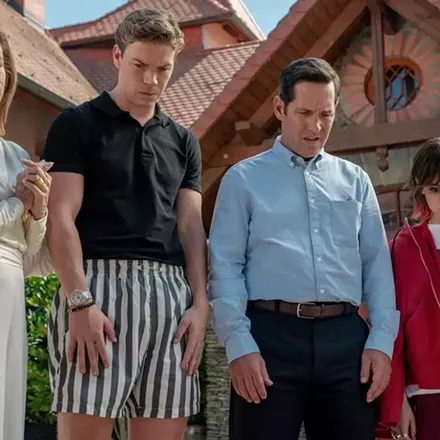
Before a single image appears on screen in Jackie, there is a deeply unsettling swell of strings from Mica Levi's score—something that begins triumphant, then dips into a kind of horror-movie dissonance. Soon, the haunted face of Jackie Kennedy (Natalie Portman) appears—eyes red-rimmed as she walks on the Kennedy family property in Hyannis Port, Mass., just a week after the assassination of her husband, President John F. Kennedy—the music continuing its eerie swing between glorious and terrifying. It's difficult to imagine a film announcing more spectacularly and efficiently what it's about, before a single word is ever spoken: a disconnect between surface spectacle, and something much darker just beneath that surface.
Chilean director Pablo Larraín (No) is making his English-language debut with one of America's defining national narratives, and it's initially intriguing to see screenwriter Noah Oppenheim attack it from a new point of view. Jackie often nails the connection between history and image, but it's also never about to let you forget that central idea. As gripping as the story manages to be at individual moments, it's held back from greatness by its repeated underlining of its own thesis statements.
Larraín and Oppenheim keep that story moving through the events of November 1963, darting back and forth in time. A framing narrative finds an unnamed journalist (Billy Crudup) interviewing Jackie as she attempts to tell her own side of the tragic tale. The film weaves back to the day of the assassination itself, and the immediate aftermath, including Jackie's visit with a priest (John Hurt). And as the widowed First Lady still grieves, she also tries to plan a service and final resting place for President Kennedy that will anchor his place in history.
Plenty of attention regarding Jackie has been focused on Portman's performance—and her perceived place as an Oscar front-runner—and as is often the case with such performances, it's sometimes hard to separate exceptional acting from exceptional achievement in mimicry. On several occasions the story introduces snippets from Jackie's 1961 televised guided tour of the White House, addressing her work on restoring many vintage historic elements to the house. Portman nails Jackie's awkwardness at being in the public eye, from her stiff-armed walk to her breathy and often vapid-seeming speech. But her performance might hit its most powerful moments when she's saying nothing—mopping JFK's blood from her face after watching him die in front of her, or drinking and smoking her way through packing up her belongings in the White House, accompanied by the title song from the musical Camelot.
That particular reference point—one cemented by Jackie in the post-assassination Life magazine interview for which the Crudup character is a stand-in—becomes just one example of how Jackie rarely seems content to introduce an idea once when it can do so two or three times. Much of the tight, 96-minute running time surrounds Jackie's detailed involvement in orchestrating the president's funeral procession, often arguing with Bobby Kennedy (Peter Sarsgård) or members of Lyndon Johnson's team. That material makes for some fascinating procedural drama, as logistics collide with what today would be called "optics," yet it also finds Jackie repeating more or less the same concept over and over again: It's all about giving Kennedy an epic send-off, something that his achievements might not have earned, but which would make sure he wasn't a forgotten victim of assassination like James Garfield or William McKinley. Larraín repeatedly holds his actors in tight close-ups, making it more inescapable as Jackie repeatedly tells the journalist how much of her story he is and isn't allowed to share, depending on how it corresponds to the legend she's trying to shape.
Jackie is engrossing enough as character study—particularly as it touches on Jackie's own conflicted emotions about lionizing a man whose personal flaws she knew all too well—that it rarely feels oppressive. Portman walks an effective, tricky line humanizing an icon whose goal was to render her family iconic. It's just a shame more of Jackie couldn't have followed the lead of that remarkable Mica Levi score, giving unexpected twists to moments that could have been pedantic or maudlin. Unlike that score, the script is content to repeat variations on a familiar theme.




